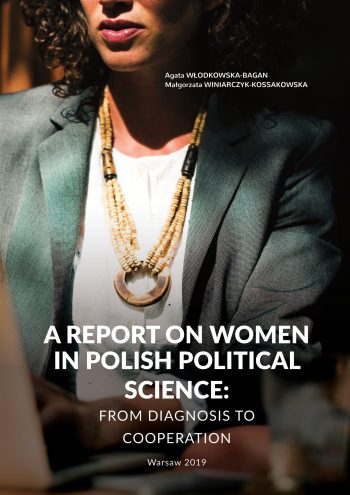Over the past few years, the number of women involved in research and innovation has been steadily increasing (for detailed statistics see She Figures 2018 report). Furthermore, the international mobility of women researchers in the higher education sector is greater. However, this does not change the fact that gender is still an important factor influencing access to high positions at universities, hampering the progress in academic careers by ignoring women’s achievements or assigning women scientists’ findings to men. As European Commission factsheet shows, there is a high need for equal treatment policy in HE institutions, monitoring of female researchers’ needs and sharing good practices in supporting women’s scientific careers.
The report ‘Women in Polish Political Science: From Diagnosis to Cooperation’, drafted by Agata Włodkowska-Bagan and Małgorzata Winiarczyk-Kossakowska, is an attempt to diagnose the situation of women political scientists employed at Polish public universities. It presents numerous conclusions and recommendations that emphasize the need to implement policies supporting gender equality in research and higher education. The findings are based on qualitative and quantitative research carried out in Poland from January 2017 to January 2018.
The report reveals that the stereotypical conviction that women are less ‘suited for scholarship’ still plays a big role in the academic environment – women scientists are less often perceived as authorities or experts, while they are more often burdened with administrative and organizational work. Discriminatory practices against female researchers are occurred in the form of off-topic comments, skipping titles in official communication, or reducing speaking time at conferences. The publication also underlines that what particularly slows down the development of an academic career of women scientists is the difficulty in combining professional and family tasks and the lack of institutional support, especially in the light of academic competition when it comes to limited number of university positions or limited access to prestigious functions. Another barrier is the lack of government legal solutions, mainly sustainable and long-term policy on gender equality in R&I.
The report presents many examples of good practices and a number of recommendations : 1) for Polish women political scientists, 2) for the authorities of HE institutions, departments, and institutes, 3) for the Ministry of Science and Higher Education and for the Political Science Association. Some of them are pointed out below:
- Implementation of parity during academic conferences, in scientific publications and scientific committees
- Aiming for a gender balance in filling positions at the university, e.g. statutory requirement for the representation of women in the committees, the university authorities and departments (at least 35%)
- Submitting regular reports to the Ministry of Science and Higher Education on the implementation of equality and anti-discrimination policy
- Creating organizational conditions to help women scientists to harmonize their social roles and professional work, i.e. by providing access to nurseries and kindergartens or by establishing flexible working hours
- Initiating small research grants for female researchers, for instance, bridging grants allowing them to return from parental leave
- Not considering maternal and parental leave in the appraisal of a woman’s academic achievement
- Promoting changes in the language (used for example in job advertisements)
The full report is available below:
More information can be found on project’s website.
It is worth noting that the report covers two cross-cutting issues of the next framework program Horizon Europe, which should be included in all clusters and activities undertaken within the program. First of all, gender equality which means supporting activities aimed at reducing the gap between the number of women and men in research teams or ensuring a balanced gender representation at decision-making levels (e.g. in advisory groups). Secondly, the greater activity of representatives of social sciences and humanities, including political sciences, in the EU framework programs.
Both cross cutting issues are monitored by the Polish Science Contact Agency on a regular basis. Therefore, in the second half of 2020, PolSCA plans to co-organize conference on the women’s presence in various fields of science and gender equality in European research. In 2019, on our initiative, the event ‘PoliSSH perspective on Horizon Europe’, devoted to the integration of social sciences and humanities in EU programs, took place. A short summary of the event with a list of recommendations can be found here.



